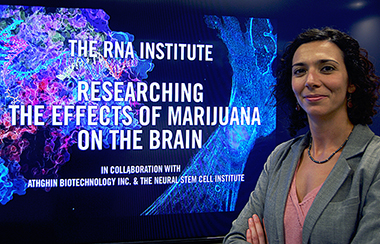The RNA Institute Investigates Effects of Marijuana and Tobacco Exposure on the Brain
Three-way partnership creates innovative tools to monitor changes in the brain’s neurological pathways due to drug exposure.
 |
|
Research scientist Maria Basanta-Sanchez of The RNA Institute developed a new scientific method using chromatography and mass spectrometry to monitor changes in the brain’s neurological pathways. |
ALBANY, N.Y. (October 10, 2014) — The University at Albany today announced a collaborative grant between its RNA Institute and area-based Athghin Biotechnology Inc., to fund research into how marijuana and tobacco exposure impact brain function. The project is supported by a $225,000 small business technology transfer (STTR) grant from the National Institute on Drug Abuse (NIDA).
Institute senior research scientist Maria Basanta-Sanchez, Ph.D., will partner with both Athghin Biotechnology Inc. and the Neural Stem Cell Institute (NSCI) on the study. The funding will also support a postdoc who will be trained in RNA science and technology.
“This National Institutes of Health (NIH) STTR award through NIDA to Athghin Biotechnology joins The RNA Institute and NSCI in creating innovative tools to monitor changes in the brain’s neurological pathways due to marijuana exposure which is an important issue in several states including New York for its medical uses,” said Sally Temple, Ph.D., scientific director of NSCI and professor in UAlbany’s Department of Biomedical Sciences.
The team aims to evaluate RNA modifications in medial frontal cortex cells upon exposure to cannabinoids from marijuana and nicotine from tobacco. It will utilize a very robust method developed by Temple’s team to produce this specific type of brain cell from pluripotent stem cells, as well as innovative tools developed by Basanta-Sanchez at the Institute to conduct the study. The ultimate goal is to find biomarkers that can be used as a diagnostic to monitor disease pathways and brain function under the influence of drugs of abuse.
“Support from Empire State Development (ESD) and NYSTAR has provided critical funding for instruments and researchers that position the Institute as a magnet for investment and innovation,” said Paul F. Agris, Ph.D., director of UAlbany’s RNA Institute. “This grant underscores the incredible potential of public-private partnerships to create innovative tools and apply them to the medical use of marijuana in comparison to the biomedical problems of tobacco and drug addiction.”
Basanta-Sanchez’s scientific method using chromatography and mass spectrometry to analyze RNA modifications at the different stages during stem cell differentiation also earned her an invitation from the National Institutes of Health (NIH) to present at the Society for Neuroscience’s annual symposium this November in Washington, D.C.
“I am very excited to be able to apply the technology I developed at The RNA Institute to a very important biomedical and societal issue,” said Basanta-Sanchez. “Understanding how brain function is effected by medical marijuana is critically important to its impact on human health.”
_________________________________________________
The RNA Institute, working in collaboration with global academic and corporate researchers, fosters a fertile, dynamic research environment that promotes the development of RNA tools and technologies to address challenging human health problems. Since its inception in 2009, federal, state and private investments have resulted in a significant expansion of faculty, research staff, labs and instrumentation, generating increased training and employment for graduate students and post-doctoral workers in RNA human health research. A world-class scientific staff; an array of advanced equipment in a mobile, modern lab infrastructure; public-private collaborations; and a dedication to scientific mentorship advance research that demonstrates broad application.
![]() For more news, subscribe to UAlbany's RSS headline feeds
For more news, subscribe to UAlbany's RSS headline feeds
A comprehensive public research university, the University at Albany-SUNY offers more than 120 undergraduate majors and minors and 125 master's, doctoral and graduate certificate programs. UAlbany is a leader among all New York State colleges and universities in such diverse fields as atmospheric and environmental sciences, business, education, public health,health sciences, criminal justice, emergency preparedness, engineering and applied sciences, informatics, public administration, social welfare and sociology, taught by an extensive roster of faculty experts. It also offers expanded academic and research opportunities for students through an affiliation with Albany Law School. With a curriculum enhanced by 600 study-abroad opportunities, UAlbany launches great careers.


